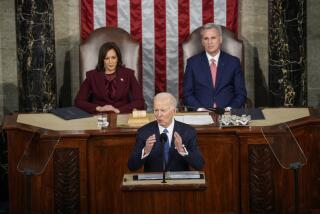Senators’ immigration talks stall
WASHINGTON — Despite days of huddling behind closed doors, the eight U.S. senators drafting an overhaul of federal immigration laws blew a self-imposed deadline for its completion Friday and packed up to leave Washington as Congress took a two-week spring recess.
Several disputes appeared to be to blame for the setback in the bipartisan talks.
They include whether to cap the number of visas given to low-skilled immigrant workers at about 200,000 each year, how much those so-called guest workers should be paid, and whether companies and businesses must advertise to hire American workers first.
Labor and business lobbies have clashed over guest workers in the past, and the two sides appeared stalemated again Friday after days of intense infighting behind doors on a hallway off the Senate chamber.
“We take two steps forward, then we take a step back,” said Sen. John McCain (R-Ariz.), a member of the group.
Sen. Patrick J. Leahy (D-Vt.), chairman of the Senate Judiciary Committee, said the two-week delay meant the committee probably wouldn’t complete the bill by the end of April for consideration by the full Senate, as he had hoped.
McCain and Sen. Jeff Flake, another Arizona Republican, will take Sens. Charles E. Schumer (D-N.Y.) and Michael Bennet (D-Colo.) to visit part of the U.S.-Mexico border next week. The draft bill will require more fencing, guards or other provisions for border security before illegal immigrants are allowed to apply for permanent residency.
One rough patch this week was a disagreement over how much immigrants should be paid under a proposed new visa category for entry-level jobs such as dishwashers, housekeepers and janitors. Negotiators for the AFL-CIO and the U.S. Chamber of Commerce brought the Senate group a proposal for how the program might work.
Their plan would create a new bureau, funded by visa fees, at U.S. Citizenship and Immigration Services. The office would compare unemployment data and job demand to determine how many work visas to issue each year, up to a cap of about 200,000.
Workers granted the special visas would be allowed to change jobs after arriving, and would not be barred from applying for legal status as a permanent resident. The number of visas would rise or fall based on a formula, and without a vote by Congress.
But the two sides couldn’t agree whether foreign workers should be paid the same wages as Americans.
The chamber argued that foreign workers should be subject to federal minimum wage law and that they should not be paid more than Americans. The AFL-CIO wanted the minimum wage for different job categories to be indexed off the median wage, saying that would produce more competitive wages for American workers.
“We’re puzzled as to why the unions would risk jeopardizing the negotiations by pushing for a provision that would drive up wages for immigrant workers above American workers,” Randel Johnson, a chamber negotiator, said in a statement.
Labor leaders, in turn, were “astonished that the Republican members of the Gang of 8 would acknowledge that their goal … is to lower the wages of the working poor,” said Jeff Hauser, spokesman for the AFL-CIO.
Eliseo Medina, secretary-treasurer of the Service Employees International Union, one of the groups involved in the talks, said negotiators sometimes carp the most when they are close to a deal. “I think it turns into that at a critical moment before something happens,” he said.
Some senators warned that the push for more work visas could leave unemployed Americans behind.
“We need to be protecting American citizens who are here, out of work, hurting today,” Sen. Jeff Sessions (R-Ala.), who is not one of the negotiators and has long opposed efforts to expand immigration, said on the Senate floor. “We seem to be more focused on how we can ram through this Senate a bill that would legalize millions and create an even more robust guest worker program.”
Sen. Lindsey Graham (R-S.C.) said the negotiators were trying to craft a program that provides needed low-skilled labor but does not “knock an American worker out of their job.”
Graham said the group would talk by phone, or through aides, through the Senate recess, which ends April 8. He said they hope to resolve the disputes and present a final draft soon after.
“We’ll be talking up to the day of the press conference, if there is one,” he said.
More to Read
Start your day right
Sign up for Essential California for news, features and recommendations from the L.A. Times and beyond in your inbox six days a week.
You may occasionally receive promotional content from the Los Angeles Times.







